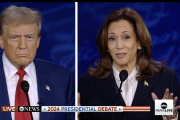
Back in 1989, Steven Covey published "
I thought of this last week when watching the debate between Vice President Kamala Harris and her rival, former President and Republican presidential nominee Donald Trump. While not the most viral moment of the debate, Harris' push for what she called an "opportunity economy" struck me as a pretty good tagline for a pretty good vision for what the economy should feel like for most Americans.
"I believe in the ambition, the aspirations, the dreams of the American people," Harris said at the debate. "And that is why I imagine and have actually a plan to build what I call an opportunity economy."
Harris had already unveiled this catchphrase a few weeks before the debate
Many of the heaviest planks of Harris' opportunity economy platform don't run directly through banking — tax reform, student loan debt relief, expanded access to childcare and banning price gouging have glancing impacts at best on the banking industry as a whole. But what she is describing is a world in which the core tenets of family life — a good home, a good job and children you can afford to take care of — are attainable not only to the fortunate and well-born but to working-class Americans as well.
That's a laudable goal, both in political and practical terms. People who have or feel like they can attain the things they want in life are happier, and happy voters are voters who will elect you and re-elect you. And if people feel like their lives are going somewhere financially stable, they will spend and invest their money in ways that lead to a stronger and more resilient economy. It is also worth noting that, for many Americans, those things are currently out of reach: household formation is now happening at
When I imagine what an opportunity economy would look like, it's a world in which consumer financial intermediation is done primarily by banks and credit unions. Insured depository institutions — both banks and credit unions — play by certain rules, and those rules exist to protect the consumer, the financial system and the institutions themselves. If opportunity is the name of the game, IDIs would be ideal partners in that game because you know that they're playing on the level.
But the banking industry and the Biden administration have not had a very productive relationship to date, and the best illustration of that dysfunction is the Basel III endgame capital proposal. The proposal was poorly executed,
For the banks' part, a combination of pent-up frustration and newfound confidence has led to a flurry of lawsuits over everything from
If we have a Harris White House, it would behoove that administration to find a way to meet its goals of safety and soundness in the banking industry without needlessly penalizing that industry. Likewise, banks should also embrace the vision of an opportunity economy as a desirable goal — not for altruistic reasons but because a vibrant and growing middle class is chock full of the kinds of customers banks and credit unions need in order to thrive.
One area of common ground that would meet both of those needs is expanding the regulatory perimeter to subject more nonbanks that engage in bank-like activities to bank-like regulatory burdens. The
If there are enough homes for people to buy, they're still going to need a mortgage; if someone wants to start a sound business, they're going to need startup capital. If there is opportunity, people will find it — that's the easy part. Turning an opportunity into a reality safely and without scams or gimmicks is the hard part, but it's what banking is all about. Moving past the dysfunction of the last year or two in banking policy may seem like a second-order problem, but if Harris wants to make middle-class financial stability a reality for more people, she needs buy-in from banks. It's an opportunity that's too good to pass up.






